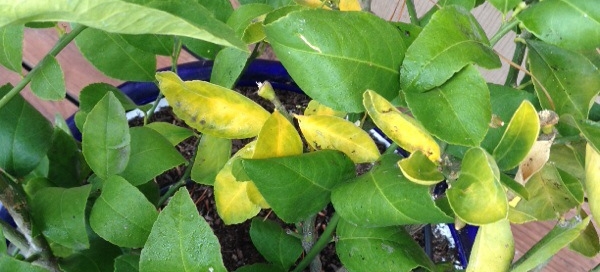Potassium Deficiency On Citrus
This not an infectious disease, nor does it appear to be caused by insects that normally feed on citrus leaves; it does however look like a deficiency of Potassium and probably Iron. Potassium is one of the 3 macro-nutrients, along with Nitrogen and Phosphorous, used by plants in the greatest amounts. The downward leaf-roll is characteristic of a lack of Potassium (in the absence of insects like Aphids and Leaf miner that can cause leaf curl and distortion), and the chlorosis (yellowing) of the upper leaves is caused by a lack of Iron. We've included a link for your reference (scroll down to the bottom to see Potassium), so we recommend asking your local garden center or agricultural supply store for a citrus fertilizer. Apply the fertilizer according to label directions, and time the applications according to the info in this weblink. Citrus should only be fertilized at certain times of year. Watering properly can become difficult when trees are grown in containers. Its easy to overwater if done too often (and especially if the roots have not developed enough to absorb the amount held in the soil/pot size), and easy to underwater if not done frequently enough when the tree is outgrowing the pot size. Make sure your tree is in full sun for 6-8 hours per day for maximum water uptake and movement thru the plant. Under and over watering cause roots to either dry out or rot, and become non-functional which results in insufficient nutrient uptake. Soil and water pH also impact the plants ability to take up nutrients. We recommend you make any necessary adjustments after doing a pH test of the soil when its moist and if the pH is not in the appropriate range of 6.8 -7 you will need to amend with the appropriate materials. You may also consider moving the tree to a different pot (sort of a start-over approach) with new soil.
http://www.ipm.ucdavis.edu/PMG/C107/m107bpleaftwigdis.html
